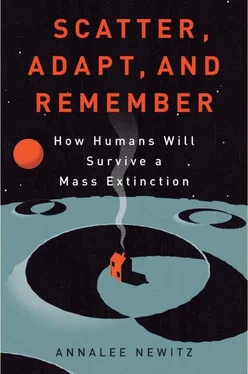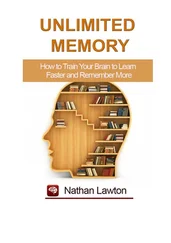Early humans evolved brains that helped us spread ideas to our compatriots even as we scattered to live among new families and communities. It’s possible that this connectedness—both neurological and social—is what allowed groups of H. sapiens to assimilate their siblings, the Neanderthals. Still, our storytelling abilities are also what allow us to remember these distant, strange ancestors today.
Humans’ greatest strength 30,000 years ago may have been an uncanny ability to assimilate other cultures. But in more recent human history, this kind of connectedness almost did us in. Once human culture scaled up to incorporate unprecedentedly enormous populations, our appetite for assimilation spread plagues throughout the modern world, almost destroying humanity many times over. And it spawned deadly famines, too. As we’ll see in the next two chapters, humanity’s old community-building habits can become pathological on a mass scale. Thousands of years after the merging of Neanderthals and H. sapiens, the practices that helped us survive in pre–ice age Europe became, in some contexts, liabilities. They wiped out whole civilizations and made it necessary for us to change the structures of human community forever.
[Death] hath a thousand slayn this pestilence.
And, maister, er ye come in his presence,
Me thinketh that it were necessarie
For to be war of switch an adversarie.
Beth redy for to meete hym everemoore.
—Geoffrey Chaucer, “The Pardoner’s Tale,”
The Canterbury Tales , 1380s
MOST PEOPLE KNOW British poet Geoffrey Chaucer because he wrote one of the earliest works of literature in English, The Canterbury Tales. What you may not know is that Chaucer came of age in a postapocalyptic world. Born in the 1340s, Chaucer would have been a little boy when the Black Death first struck England, in 1348; in the next few years it wiped out over 60 percent of the population of the British Isles. The son of a wealthy wine merchant, Chaucer grew up in London, already a bustling city where traders arriving in ships from Europe would have brought news of the “pestilence” ripping through the continent. The late 1340s marked the first great pandemic of what would later be called the bubonic plague, and the death tolls were so high that most bodies were thrown into mass graves because churchyards were overflowing. Even if there had been room for the corpses, it’s likely there were not enough clergy left to coordinate burials. Chaucer came of age in the wake of a pandemic so deadly that half the population of London perished.
We hear of the Black Death only rarely in Chaucer’s considerable body of work, most memorably in the lines I’ve quoted above from The Canterbury Tales . The corrupt Pardoner is telling his fellow travelers a tale of three angry drunks who decide to kill Death, to avenge their friend’s murder. Violently intoxicated, they demand that a little boy carrying corpses to the graveyard tell them where to find “Deeth.” The boy warns them that Death “hath a thousand slayne this pestilence,” or slain a thousand people during the last bout of plague. The boy adds that they should be ready to meet Death “everemoore,” anytime. This casual reference to “pestilence,” written over 40 years after the plague first shattered England, indicates how ordinary the specter of mass death had become for people of Chaucer’s generation. The disease had returned again and again to claim thousands of lives during the late fourteenth century, though not with the ferocity that it had in Chaucer’s boyhood. The pestilence may not have touched the poet’s writings much, but its social reverberations marked his life and those of all his countrymen.
Plague was a symptom of the problems humans had adapting to our own growing societies. By the time the Middle Ages rolled around, we were old pros at the symbolic-culture game that helped us outlast the Neanderthals, but we still had little experience with using that symbolic culture to unite large societies made up of many disparate groups. Humans first began experimenting with such societies during classical antiquity, in sprawling ancient empires like those of the Assyrians, the Romans, the Han, and the Inca. But these civilizations were exceptions rather than the norm for most people. During Chaucer’s lifetime in the Middle Ages, however, humanity began laying the foundations for what would over the next five centuries grow into modern, global society. And this transformation meant that for the first time, the greatest threat to humanity came not from nature, but from ourselves.
A Revolutionary Pestilence
In a country whose population was only 40 percent of what it had been in the years before his birth, Chaucer grew up with opportunities he might never have had otherwise. A man of lively intelligence, he got an uncommonly good education working as an esquire at the court of Edward III, a typical role for the child of a wealthy merchant. He managed to get good legal training by studying with attorneys who worked in the court’s “Inner Temple,” essentially a medieval law school. And then he found paying work as a representative for various members of the royal family, conducting business for them abroad (where he learned French and Italian) and eventually in London. Because Chaucer did so much business for the crown, he left a surprisingly detailed paper trail, including travel authorizations, expense accounts, promises of payment, and legal documents. Scholars have pieced together his life from these scraps of paper.
We know from these records that for twelve years, the former esquire lived with his wife and children in Aldgate, one of the wealthiest neighborhoods of London. Chaucer’s home was a fine set of rooms right above a gate in the ancient defensive walls that surrounded the city. In typical feudal fashion, the mayor had granted the dwelling to Chaucer rent-free at roughly the same time that Edward III put the future poet in charge of managing export taxes on wool in London’s Custom House. Apparently, Chaucer was quite good at his job. He did valuable accounting for the kingdom during the day, and probably made his first efforts at writing poetry during the evenings. Though Chaucer managed vast sums of money for the crown, he and his family were what would one day be called middle class. Connections to the royal family gave them just enough stature to merit a good living (his salary included a daily gallon pitcher of wine), and a nice home. One side effect of the Black Death was a dramatic reshuffling in the upper echelons of society, whose members had been thinned by the pestilence. Chaucer flitted from one good job to the next, always working closely with the crown, because there was a shortage of educated men who did not owe blood allegiance to one aristocratic family or another.
The same grisly population crash that sent Chaucer and his family up the social ladder was affecting the peasant class, too. And in 1381, Chaucer’s life was threatened by the results. It was the year of the Peasants’ Revolt, a series of violent riots fomented by peasants demanding better wages and treatment. They happened literally beneath the Chaucer family’s windows in Aldgate, and many of the rioters were armed with weapons and torches; the angry protesters left a lot of Chaucer’s rich neighbors dead.
But why did a disease epidemic lead to riots for better pay? Call it cultural adaptation in action. Jo Hays, a historian at Loyola University whose work focuses on pandemics in the ancient world and the Middle Ages, explained that the Black Death had upset a stalemate in class relations that had lasted centuries. Peasants, long tied to the land by the feudal system, had been trapped in serfdom because there were no other options. As the peasant population ballooned, their lords could afford to grant them less and less—it was a landlord’s market, as it were. The poor starved, but had no options. When the Black Death hit, most of the people who died were impoverished folk whose health was already compromised by lack of food. The survivors, like Chaucer, found themselves in a world where jobs were suddenly plentiful. Couple this situation with the rise of money wages (like those Chaucer’s family got as merchants) instead of land grants, and for the first time in centuries, peasants could exercise a degree of choice over their work.
Читать дальше






![Аннали Ньюиц - Автономность [litres]](/books/424681/annali-nyuic-avtonomnost-litres-thumb.webp)





